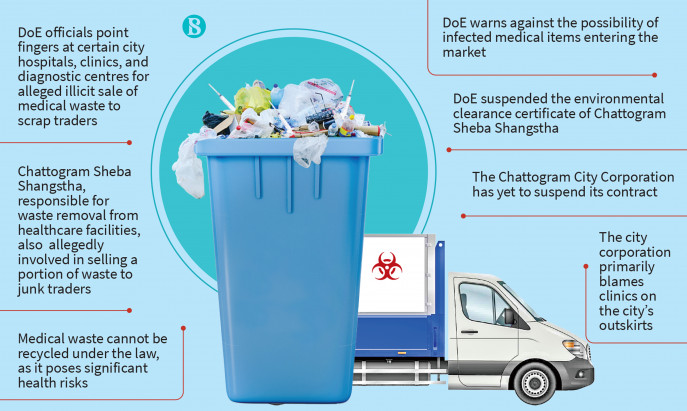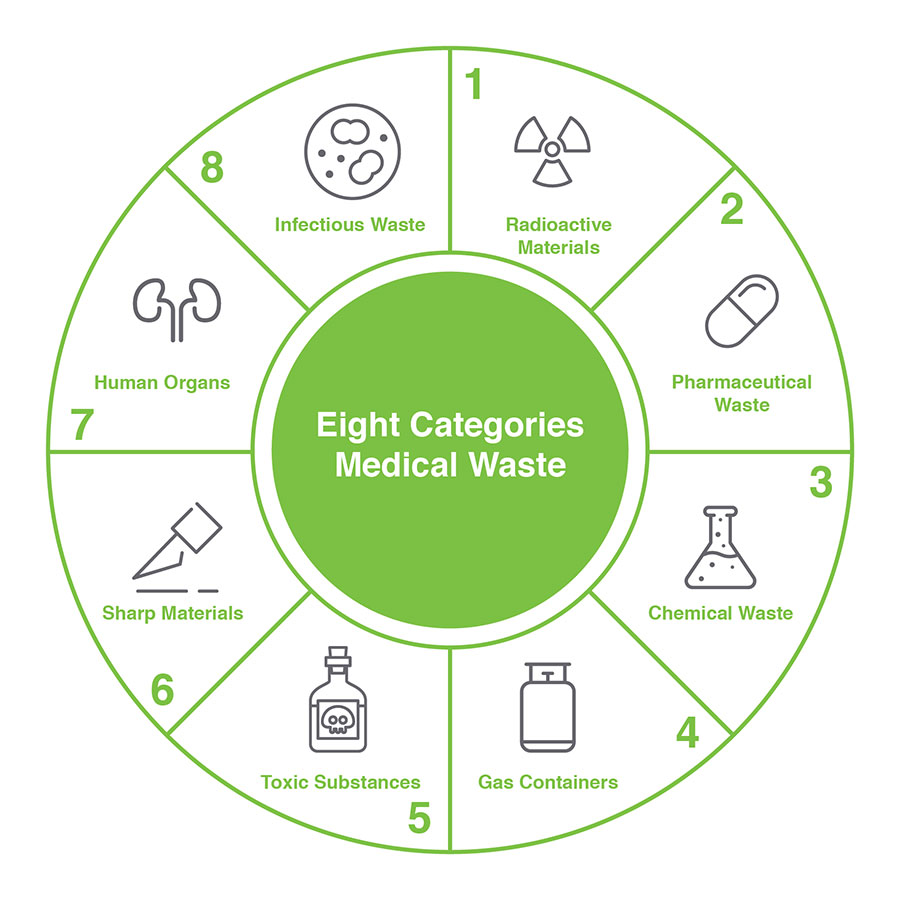Beyond Clean-up: Ensuring Security with Expert Medical Waste Removal
Remain Ahead of Rules: Specialist Advice on Medical Waste Disposal
In a globe where the medical care sector is constantly developing, it is critical for clinical centers to remain in advance of regulations when it concerns the proper disposal of medical waste. With strict guidelines and regular governing changes, it can be challenging to browse the intricacies of this procedure. However, with experienced suggestions, centers can make certain conformity and minimize dangers connected with incorrect garbage disposal. From comprehending the various classifications of medical waste to implementing the right collection and partition approaches, this conversation will provide actionable pointers and useful insights to help centers stay ahead of laws in the ever-changing landscape of clinical waste disposal.
Recognizing Medical Waste Categories
Recognizing medical waste groups is important for correct disposal and management in medical care facilities. Medical waste describes any waste created by health care tasks that may present a threat to public health and wellness or the environment. It is crucial to categorize medical waste precisely to ensure its risk-free handling, transportation, disposal, and therapy.
There are several groups of medical waste that health care centers require to be knowledgeable about. The most typical groups include contagious waste, pathological waste, sharps waste, pharmaceutical waste, and chemical waste. Each classification has particular standards and guidelines for its appropriate administration and disposal.
Infectious waste consists of materials contaminated with blood or various other bodily liquids, such as gloves, dress, and laboratory cultures. Pathological waste describes human tissues, organs, or body parts that call for special handling and disposal. Sharps waste includes utilized needles, syringes, and other sharp objects that can trigger injury and transfer infections. Drug waste makes up expired, unused, or polluted medicines that require mindful handling and disposal. Lastly, chemical waste consists of solvents, anti-bacterials, and various other chemical compounds utilized in medical care facilities.
Staying Up-To-Date With Regulatory Modifications
Remaining current with governing changes is essential for health care facilities to make certain compliance and proper monitoring of medical garbage disposal. medical waste removal services. With laws continuously evolving, it is crucial for medical care centers to stay up-to-date to stay clear of fines, fines, and possible injury to the setting and public health
To remain in advance of regulative adjustments, healthcare centers must establish a system for surveillance and monitoring updates. This can be done by registering for regulative e-newsletters, participating in workshops and conferences, and actively taking part in industry organizations. In addition, centers ought to mark a personnel member or team in charge of staying notified and sharing details to pertinent stakeholders.
Regular interaction with regulatory agencies is additionally crucial. Healthcare centers must establish partnerships with regional, state, and federal agencies to guarantee they know any kind of modifications in regulations that might influence their waste administration techniques. This can be done with routine conferences, involvement in public remark periods, and positive involvement with regulatory agencies.
Furthermore, health care facilities should take into consideration partnering with waste monitoring business that specialize in medical waste disposal (medical waste disposal services with WasteX). These companies are commonly skilled in the latest guidelines and can give advice and assistance to guarantee conformity
Implementing Proper Collection and Segregation Techniques
To effectively take care of clinical garbage disposal, medical care centers must develop correct collection and partition methods based on regulatory standards. Executing these methods ensures the safe handling and disposal of potentially unsafe products, shields the environment, and lessens the threat of injuries and infections to health care workers and the basic public.
Appropriate collection and segregation methods entail using assigned containers and classifying systems. Healthcare facilities ought to supply plainly identified containers for various kinds of medical waste, such as sharps, infectious waste, pharmaceutical waste, and non-hazardous waste. These containers need to be color-coded and plainly marked to prevent complication and advertise very easy identification.
Additionally, healthcare centers need to educate their personnel on the proper procedures for accumulating and segregating medical waste. This includes educating them on the different kinds of waste, the suitable containers to make use of, and the value of adhering to regulations and standards. Regular training sessions and refresher courses should be conducted to ensure that team member continue to be updated on ideal methods.
Furthermore, medical care centers need to develop a system for regular collection and disposal of clinical waste. This might include partnering with licensed waste monitoring business that focus on medical garbage disposal. These business will certainly guarantee that the collected waste is transported and thrown away in conformity with regulative needs.
Choosing the Right Disposal Methods

Incineration is just one of one of the most typical and efficient methods for throwing away certain kinds of medical waste, such as pathological waste and sharps. It includes the controlled combustion of waste at heats, lowering it to ash. Incineration can launch damaging contaminants into the air and contribute to web link air contamination.

Various other disposal methods consist of chemical treatment, microwave treatment, and landfilling. Chemical therapy includes the use of chemicals to sanitize and counteract the waste. Microwave treatment makes use of microwave power to warmth and decontaminate the waste. Landfilling includes hiding the waste in a designated landfill area (medical waste disposal services with WasteX). However, landfilling should be the last hope due to the prospective danger of contamination to soil and groundwater.
Making Sure Compliance Via Documentation and Training
After meticulously considering the appropriate disposal methods for clinical waste, healthcare centers need to guarantee compliance with policies and decrease ecological impact by implementing reliable documentation and training procedures. This step is essential in keeping a sustainable and safe setting for both health care employees and the public.
Training is equally important in making sure conformity with guidelines. Health care employees that deal with medical waste ought to obtain suitable moved here training on waste segregation, managing, and disposal treatments. This training must cover subjects such as the proper usage of personal protective tools, identification of various sorts of waste, and the appropriate disposal methods for every waste classification. By offering detailed training, medical care facilities can empower their team to make informed decisions and lessen the threat of inappropriate garbage disposal.
Conclusion
Finally, staying in advance of laws in clinical waste disposal is important for health care facilities. medical waste removal service. Understanding the various classifications of medical waste, staying upgraded with regulative changes, implementing correct collection and partition methods, choosing the ideal disposal techniques, and guaranteeing conformity with documents and training are all important steps. By complying with these guidelines, medical care organizations can effectively dispose and handle of medical waste in a responsible and risk-free manner
From understanding the various groups of medical waste to applying the ideal collection and segregation techniques, this discussion will certainly provide workable suggestions and beneficial insights to aid facilities remain in advance of policies in the ever-changing landscape of clinical waste disposal. - medical waste disposal services with WasteX
The most common classifications include contagious waste, pathological waste, sharps waste, pharmaceutical waste, and chemical waste. Medical care centers should provide clearly labeled containers for different types of medical waste, such as sharps, contagious waste, pharmaceutical waste, and non-hazardous waste. Health care facilities must develop a detailed system to videotape and track all facets of clinical waste disposal, consisting of kinds of waste produced, amounts, and disposal techniques utilized. Health care workers who deal with medical waste should receive appropriate training on waste partition, taking care of, and disposal treatments.